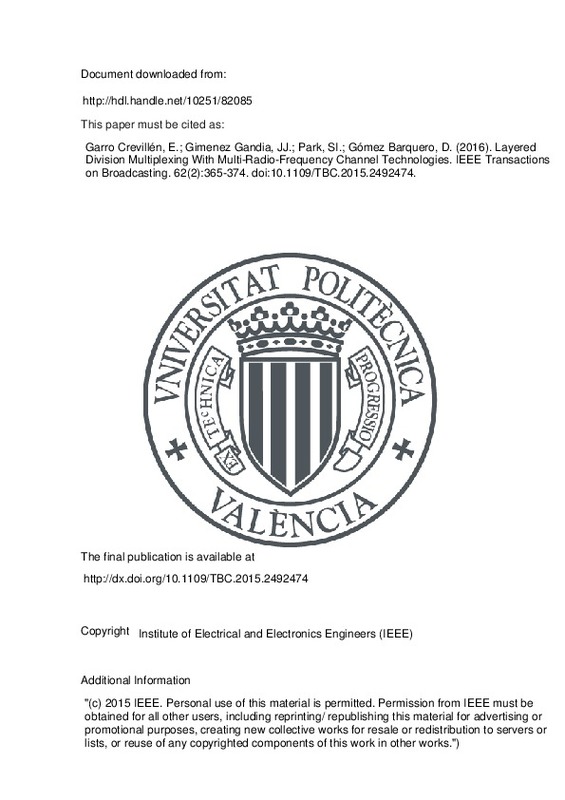Garro Crevillén, E.; Gimenez Gandia, JJ.; Park, SI.; Gómez Barquero, D. (2016). Layered Division Multiplexing With Multi-Radio-Frequency Channel Technologies. IEEE Transactions on Broadcasting. 62(2):365-374. doi:10.1109/TBC.2015.2492474
Por favor, use este identificador para citar o enlazar este ítem: http://hdl.handle.net/10251/82085
|
Título:
|
Layered Division Multiplexing With Multi-Radio-Frequency Channel Technologies
|
|
Autor:
|
 Garro Crevillén, Eduardo
Garro Crevillén, Eduardo
 Giménez Gandia, Jordi Joan
Park, Sung Ik
Giménez Gandia, Jordi Joan
Park, Sung Ik

 Gómez Barquero, David
Gómez Barquero, David
|
|
Entidad UPV:
|
Universitat Politècnica de València. Instituto Universitario de Telecomunicación y Aplicaciones Multimedia - Institut Universitari de Telecomunicacions i Aplicacions Multimèdia
|
|
Fecha difusión:
|
|
|
Resumen:
|
The advanced television system committee (ATSC) is to release the next-generation U.S. digital terrestrial television standard, known as ATSC 3.0. Layered division multiplexing (LDM) is one of the new physical layer ...[+]
The advanced television system committee (ATSC) is to release the next-generation U.S. digital terrestrial television standard, known as ATSC 3.0. Layered division multiplexing (LDM) is one of the new physical layer technologies included in the standard, which enables the efficient provision of mobile and fixed services by superposing two independent signals with different power levels. ATSC 3.0 has also adopted a novel transmission technique known as channel bonding (CB), which splits the data of a service into two sub-streams that are modulated and transmitted over two radio-frequency (RF) channels. This paper investigates the potential use cases, implementation aspects, and performance advantages, for combining LDM with CB and also with the multi-RF channel technology time frequency slicing (TFS) introduced in digital video broadcasting - terrestrial second generation (DVB-T2) (as an informative annex) and digital video broadcasting - next generation handheld (DVB-NGH) which allows distributing the data of a service across two or more RF channels by means of time slicing and frequency hopping.
[-]
|
|
Palabras clave:
|
ATSC 3.0
,
Layered division multiplexing (LDM)
,
Channel bonding (CB)
,
Terrestrial broadcasting
,
Time frequency slicing (TFS)
|
|
Derechos de uso:
|
Reserva de todos los derechos
|
|
Fuente:
|
IEEE Transactions on Broadcasting. (issn:
0018-9316
)
|
|
DOI:
|
10.1109/TBC.2015.2492474
|
|
Editorial:
|
Institute of Electrical and Electronics Engineers (IEEE)
|
|
Versión del editor:
|
http://dx.doi.org/10.1109/TBC.2015.2492474
|
|
Código del Proyecto:
|
info:eu-repo/grantAgreement/MSIP//R0101-15-294/KR/
|
|
Descripción:
|
"(c) 2015 IEEE. Personal use of this material is permitted. Permission from IEEE must be obtained for all other users, including reprinting/ republishing this material for advertising or promotional purposes, creating new collective works for resale or redistribution to servers or lists, or reuse of any copyrighted components of this work in other works.")
|
|
Agradecimientos:
|
Parts of this paper have been published in the Proceedings of the IEEE International Symposium on Broadband Multimedia Systems and Broadcasting, Ghent, Belgium, in 2015. This work was supported by the ICT Research and ...[+]
Parts of this paper have been published in the Proceedings of the IEEE International Symposium on Broadband Multimedia Systems and Broadcasting, Ghent, Belgium, in 2015. This work was supported by the ICT Research and Development Program of MSIP/IITP. [R0101-15-294, Development of Service and Transmission Technology for Convergent Realistic Broadcast.]
[-]
|
|
Tipo:
|
Artículo
|







![[Cerrado]](/themes/UPV/images/candado.png)


